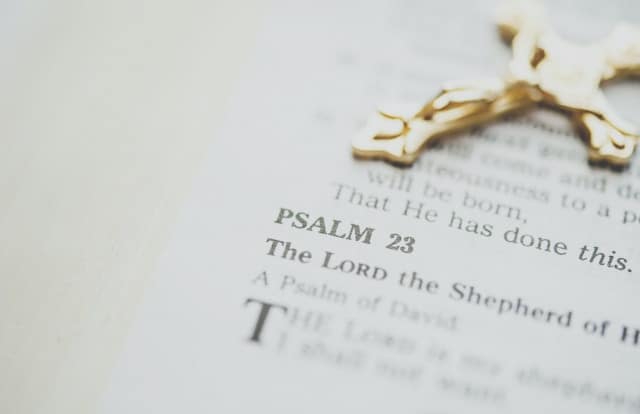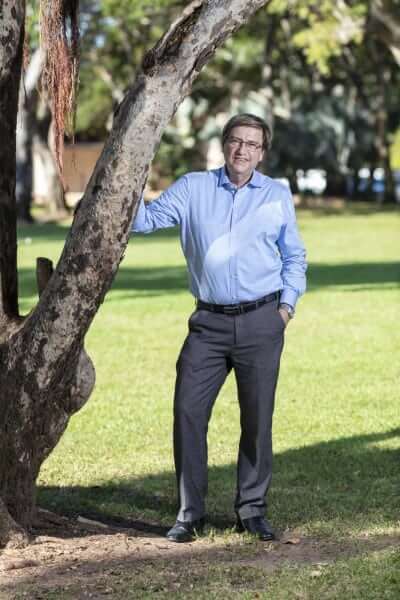Darwin Council Alderman Gary Haslett has criticised a proposal to scrap the Lord’s Prayer from being read at the opening of council meetings, labelling any move to block it “cultural vandalism”.
Fighting the long entrenched tradition, Alderman Robin Knox said the council process is “not very inclusive” and suggested a more “universal blessing” might be more appropriate.
But Mr Haslett strongly objected, saying the prayer was part of his “heritage” and that “more than 80 per cent of the world has the same background”.
A multitude of councils across Australia have shifted away from the prayer in recent years in the name of inclusivity, but the idea of doing away with the tradition sparked impassioned debate at Tuesday night’s council meeting.
“Darwin has over 70 ethnic groups… I think a more universal blessing would be appropriate,” Alderman Knox said.
“Whether the blessing be combined with the acknowledgement of country or it be a universal blessing, or whatever, this is something the public could tease out in consultation.
“I feel at the moment, the Lord’s Prayer represents only one part of our community, and it is such a diverse community.”
The Darwin Council commences each of its meetings standing to chorus an acknowledgement of country followed by the Lord’s Prayer.

Alderman Robin Knox said she had received complaints the Lord’s Prayer was not inclusive of a “very diverse” community.
Across the rest of the country, many councils have scrapped the prayer. Half of Central Victoria’s councils have discarded it and a petition signed by more than 800 people is calling for Brisbane City Council to make the move.
Greens Leader Richard di Natale said the Lord’s Prayer in Federal Parliament was an anachronism in 2014.
Australia’s religious makeup has shifted significantly over the past 10 years, according to the Australian Bureau of Statistics (ABS).
Those reporting “no religion” in the national census increased from 19 per cent in 2006 to 30 per cent in 2016.
In Darwin, ABS statistics showed in 2011, 55 per cent of people held Christian beliefs. But in 2016, that dropped to less than 45 per cent.
The Lord’s Prayer is also currently read out before all NT Legislative Assembly sittings.
“This is my heritage, my culture”: Haslett on keeping prayer
Alderman Gary Haslett said this was not the first time the issue of praying had been raised in council, and a request for a change had been knocked back previously.
“The words of this prayer, there is nothing you could find issue with,” he said. “If we followed what [the Lord’s Prayer] said, we would do our jobs very well.”
“This is cultural vandalism,” Alderman Haslett told the council.
“This is my heritage, my culture that has been with my forebearer’s for thousands of years and I must say more than 80 per cent of the world has the same background.”

Alderman Gary Haslett.
Alderman Haslett was not the only elected member to oppose ending the prayer.
Alderman Mick Palmer said the Lord’s Prayer is a “universal reminder to do our duty, to do our best”.
“It is an important part of our heritage… and democratic tradition that we maintain these things as a reminder,” he said.
“Many people have come to Australia because of those traditions, because of the general good governance that people of the City of Darwin and various councils around Australia and various state and federal governments impart.
“You may not always agree with the policies of said governments, but generally they [make decisions] in the spirit the Lord’s Prayer intended them to.”
Alderman Justine Glover told councillors that when she was first elected to the council she also questioned the relevance of the prayer.
But she said she was told it is “a way of us coming together and saying the prayer and acknowledging we are moving from our daily lives… to concentrate on our community’s business.”
Lord Mayor Kon Vaskalis said it is not about religion, but rather about tradition.
“The way we meet here today… is part of a tradition of the time when the first council met in Darwin,” he said.
“Religion is part of my national and cultural heritage and I cannot seperate the two.”
The motion, which would have come at a cost to rate payers, as council would have needed to consult the community, was voted down with eight Alderman opposing the idea.
Alderman Simon Niblock however said the council needed to recognise the community has changed and is no longer “a colony or an outpost of England”.





> more than 80 per cent of the world has the same background
poor mr haslett never was good with numbers.
(first elected to waters ward with the lowest number of primary votes;
100 less primary votes than the rubbish warrior)
Whatever happened to the separation of Church and State? As I understand it, there is no provision preventing Council Members choosing to pray, either privately or collectively, prior to Council meetings if they believe Divine Intervention is necessary for them to properly fulfill their duties as Elected Members of Council. I would, however, prefer that Council deliberations are driven by a secular sense of the needs of the electorate. We don’t have to go back too far in Territory history to see how the super-imposition of religious dogma on a democratically elected Government can lead to Laws being modified to remain in line with an ultra-conservative viewpoint. Kevin Andrews, a Liberal, conservative, Catholic Federal backbencher stuck his nose where it wasn’t wanted and introduced a private member’s bill, the Euthanasia Laws Bill 1996, which was passed in 1997 and overrode the Northern Territory’s legislation, the Rights of the Terminally Ill Act 1995, that legalised euthanasia in the Territory. Keep religion where it belongs – in a House of Worship.